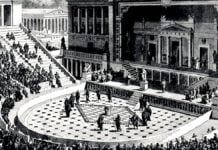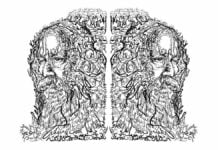A Vision is a poem by Simon Armitage featured in Tyrannosaurus Rex versus the Corduroy Kid. It explores the interaction between imagination and reality, the internal and external self, and the disillusionment that can arise from idealistic expectations. The poem creates a warm, inviting tone and describes the ideals of a model of a city. But at each turn, the ideas this espouses are refuted and subverted. Sometimes, very subtly, they never reveal genuine problems with these ideals until the final sentence, where this vision of an ideal future is finally dismissed.
Summary
A Vision presents an evocative and ambiguous encounter between the speaker and a mystical, ghost-like figure seen on a hillside. This vision unfolds like an allegorical dream or surreal spiritual episode, but its meaning resists clarity. The setting—a remote, possibly liminal space—acts as both a physical and psychological landscape, where the boundaries between the internal and external blur.
The poem begins with the speaker witnessing a peculiar, almost spectral figure. At first, the figure appears awe-inspiring or sublime—its “hairs of gold” and “eyes like polished quartz” carry divinity, purity, or enlightenment connotations. These features evoke the biblical or mythological trope of the radiant seer or angelic messenger. Yet, Armitage swiftly undercuts this sense of grandeur: the figure is riddled with signs of wear, fragility, and detachment, described in language associated with decay—”dead as driftwood”, “scarecrow’s rags”, etc.
The speaker approaches, seemingly in search of revelation or meaning. However, instead of imparting wisdom or comfort, the figure offers gestures and fragmented speech, leaving the speaker more puzzled than enlightened. The poem’s structure mirrors this—there is no climax or catharsis, only a gradual erosion of certainty. The “vision” symbolises the failure to connect, to receive understanding, or to arrive at truth.
In the final stanzas, the speaker reflects on what this encounter might signify: is it a mirror of the self? A symbol of lost faith or hope? A commentary on the futility of seeking truth in a postmodern, disenchanted world? The speaker leaves the scene without resolution, burdened not by divine knowledge but by a profound sense of disorientation and introspection.
Vision and Disillusionment
At its heart, A Vision deconstructs the traditional literary trope of epiphanic encounter—the moment of vision, revelation, or transcendence. Drawing from centuries of mystical, religious, and Romantic traditions (such as those of Blake, Wordsworth, and Yeats), Armitage sets the expectation of spiritual insight but quickly subverts it.
Instead of divine enlightenment, the speaker encounters ambiguity, failure, and silence. This is a postmodern vision—not full of answers, but full of questions. The poem reflects the collapse of metaphysical certainties and the modern individual’s struggle with a disenchanted universe.
A Vision becomes an anti-epiphany, a moment not of revelation, but of self-awareness through disappointment.
Liminal Space and Symbolic Setting
The poem’s landscape is crucial: a cold hillside, barren and removed from urban civilisation, functions as a liminal zone—a threshold between waking and dreaming, known and unknown. It mirrors the speaker’s inner desolation and spiritual hunger. The isolation enhances the sense of a solitary quest or pilgrimage, evoking Christian, Celtic, and Romantic literary traditions.
Rather than a rewarding pilgrimage, the speaker experiences a sense of spiritual estrangement. The figure encountered does not guide but reflects the speaker’s doubts, like a distorted mirror.
Themes
Disillusionment and Loss of Faith
The poem critiques the human desire for spiritual or intellectual certainty in an age of elusive certainties. The “vision” promises wisdom but delivers obscurity, suggesting the failure of traditional frameworks to address modern existential concerns.
Identity and Self-Reflection
The vision may represent a fragmented version of the self—a projection of the speaker’s internal fears, doubts, or failed aspirations. The poem questions whether clarity lies outside the self or must be constructed internally.
The Illusory Nature of Epiphany
There’s a deliberate undercutting of the romantic or religious notion of revelation. Instead of being uplifted, the speaker is haunted by ambiguity, reinforcing the postmodern idea that meaning is constructed, unstable, and often deferred.
Psychological and Existential Undertones
The vision may represent a psychological projection—a manifestation of the speaker’s subconscious doubts, regrets, or lost ideals. This reading places the poem in modern psychological introspection, akin to the works of T.S. Eliot or Philip Larkin, where the external world is often a metaphor for the inner crisis.
Themes of
- Loss of faith
- Failed transcendence
- Unreliable perception
- Estrangement from the divine or the self
pervade the poem. Armitage thus places the speaker in a tradition of the alienated seeker, much like Prufrock or the persona in Yeats’s later poetry.
Form and Structure
A Vision is written in free verse, reflecting the stream-of-consciousness nature of the speaker’s experience. The lack of a fixed rhyme scheme or metrical regularity enhances the poem’s dream-like and unstable atmosphere. The layout mirrors the fluidity between perception and reality and the disintegration of coherent thought.
Language and Imagery
Armitage’s poetic language in A Vision is conversational yet symbolic, a hallmark of his broader oeuvre. His imagery is concrete and grounded—evoking physical sensation and decay—but simultaneously layered with allegorical meaning. Phrases like “a scarecrow’s rags” and “dead as driftwood” depict the vision of decay and abandonment, evoking wasteland imagery akin to T.S.Eliot.
“Scarecrow’s rags” and “dead as driftwood” evoke abandonment, erosion, and fragility—typical of post-industrial landscapes and personal psychological collapse.
“Eyes like polished quartz” suggests unreadability; the vision can be seen but not understood. Quartz, a semi-precious stone, symbolises both beauty and opacity.
The fusion of the sublime and grotesque reflects the speaker’s internal conflict—his longing for transcendent meaning and the grim truth of his disillusionment. The language is mythic and modern, creating a tension between ancient archetypes and contemporary alienation. Armitage’s refusal to romanticise the encounter reflects his anti-lyrical, anti-idealistic stance, presenting spiritual search as riddled with failure.
Tone and Mood
The tone fluctuates between awe, desperation, and scepticism. The initial anticipation gives way to bitterness and irony, especially in how the speaker narrates his disappointment. The mood is psychological unease, capturing the modern mind’s restless search for meaning in a secularised world.
Irony and Modern Scepticism
There is an unmistakable ironic undercurrent in the poem. The title, A Vision, suggests something clear, uplifting, or spiritually rich. What the speaker receives, however, is a fragmentary and broken image. This irony sharpens Armitage’s critique of cultural myths of enlightenment.
He offers a secularised vision, where the sacred has been stripped of its transcendence and replaced by psychological residue and failed symbolism. Even the aesthetic of the vision is anti-heroic—worn, blurred, and shabby.
Intertextual Resonances
The poem invites several intertextual comparisons:
- Romantic poets like Wordsworth or Blake who sought visionary experiences in nature.
- Yeats, whose prophetic and visionary poetry blends myth and spiritual urgency.
- T.S.Eliot, particularly The Waste Land, for the theme of spiritual sterility and fruitless searching.
- Postmodern poetry that dwells in fragmentation, ambiguity, and the absence of divine presence.
By placing A Vision within this lineage, Armitage positions himself both as heir and critic of poetic tradition, acknowledging its forms while undermining their assurances.
Simon Armitage’s A Vision is a poem of profound subtlety and unresolved complexity. It grapples with the modern spiritual and existential uncertainty condition, using the language of vision and encounter to stage a confrontation with absence, silence, and ambiguity.
It speaks to a contemporary readership increasingly aware of the limits of faith, language, and self-knowledge. Armitage dissects the human need for meaning in a world that often withholds it through layered imagery, symbolic setting, and understated irony. A Vision is not a revelation but a reckoning, and in that lies its power.


























